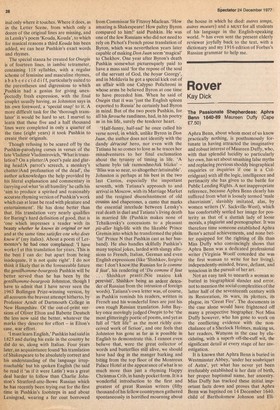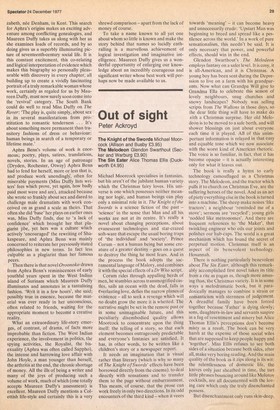Rover
Kay Dick
The Passionate Shepherdess: Aphra Bann 1640-89 Maureen Duffy (Cape £7.50) Aphra Benn, about whom most of us know practically nothing, is posthumously fortunate in having attracted the imaginative and robust interest of Maureen Duffy, who, with that splendid lucidity so particularly her own, has set about smashing false myths and replacing previous shoddy biographical enquiries or inquiries if one is a Coleridgean) with all the logic, intelligence and pertinacity she has given to the battle for Public Lending Rights. A not inappropriate reference, because Aphra Been clearly has suffered from what is loosely termed 'male chauvinism', slavishly imitated, alas, by women writers (V. Sackville-West), which has comfortably settled her image for posterity as that of a sluttish lady of loose morals, a plagiarist and pornographer. It was therefore time someone established Aphra Benn's actual achievements, and none better equipped for the righting of ills than Miss Duffy who convincingly shows that Aphra Benn was a dedicated professional writer (Virginia Woolf conceded she was the first woman to write for her living), independently-minded, brave, defiant, and tenacious in the pursuit of her art.
Not an easy task to unearth a woman so buried in biographical slander and error, not to mention the social complexities of the latter half of the seventeenth century with its Restoration, its wars, its plotters, its plague, its 'Great Fire'. The documents in the case alone would have frightened off many a prospective biographer. Not Miss Duffy however, who has gone to work on the conflicting evidence with the nonchalance of a Sherlock Holmes, making us, her readers, Watsons in the case by elucidating, with a superb off-the-cuff wit, the significant detail at every stage of her investigation.
It is known that Aphra Benn is buried in Westminster Abbey, 'under her soubriquet of Astra', yet what has never yet been irrefutably established is her date of birth, her proper baptismal name, her ancestry. Miss Duffy has tracked these initial, important facts down and proves that Aphra Benn was baptised on 14 December 1640. child of Bartholomew Johnson and Eli zabeth, née Denham, in Kent. This search for Aphra's origins makes an exciting adventure among conflicting genealogies, and Maureen Duffy takes us along with her as she examines loads of records, and by so doing gives us a superbly illuminating picture of seventeenth-century social life. It is this constant excitement, this co-relating and logical interpretation of evidence which makes this biography so personally pleasurable with discovery in every chapter; all building up to create a vividly fascinating portrait of a truly remarkable woman whose work, certainly as regaled for us by Maureen Duffy, must now surely soon come into the 'revival' category. The South Bank could do well to read Miss Duffy on The Rover: 'The play is, quite simply, about sex in its several manifestations from prostitution to romantic tenderness . . . It's about something more permanent than transitory fashions of dress or behaviour: human beings in search of a temporary or lifetime mate.'
Aphra Bern's volume of work is enormous; poetry, plays, satires, translations, novels, stories. In an age of patronage (Dryden, Rochester, Otway) Aphra Benn had to fend for herself, more or less that is, and' produce work unendingly'', often for miserable payments (Miss Duffy lists writers' fees which prove, yet again, how badly paid most were and are), attacked because she wrote so frankly about sex and dared to challenge male dramatists with work conceived on as grand a scale as theirs. That often she did 'base' her plays on earlier ones was, Miss Duffy finds, due to 'a lack of confidence' which brought her that plagiarist jibe, yet hers was a culture which actively 'encouraged' the rewriting of Shakespeare, and Aphra Benn was mainly concerned to reiterate her previously stated philosophies in new terms. In fact less culpable as a plagiarist than her famous peers. Then there is that novel Oroonoko drawn from Aphra Benn's reminiscences of early youthful years spent in the West Indian island of Surinam which Maureen Duffy illuminates and annotates in a tantalising fashion. 'Writ it in a few hours', she said; possibly true in essence, because the material was ever ready in her unconscious, often related to friends, waiting for the appropriate moment to become a creative reality. What an extraordinary life-story emerges, of contrast, of drama, of facts more improbable than fiction, The West Indian experience, the involvement in politics, the spying activities, the Royalist, the bisexuality (Aphra was often called Sappho), the intense and harrowing love affair with John Hoyle, a man younger than herself, the arthritis at the end, the chronic shortage of money. All the ills of being a writer and many of the joys of producing such a volume of work, much of which (one totally accepts Maureen Duffy's assessment) is excellent. Maureen Duffy mentions a Colettish life-style and certainly this is a very shrewd comparison — apart from the lack of money of course.
To take a name known to all yet one about whom so little is known and make the story behind that names so lucidly enthralling is a marvellous achievement of logical investigation and imaginative intelligence. Maureen Duffy gives us a wonderful opportunity of enlarging our knowledge about an incredibly courageous and significant writer whose best work will perhaps now be made available to us.











































 Previous page
Previous page